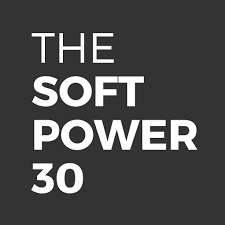
http://www.uscpublicdiplomacy.org/story/hot-press-2018-soft-power-30
The United Kingdom leads the pack when it comes to soft power this year, according to the latest Soft Power 30 Index. Having ranked second for the past two years—and despite Brexit—Britannia's move into first place is owed to its enduring cultural institutions, creative industries, higher education, technological developments and diplomatic assets. American soft power has continued its decline since 2017, precipitated by a significant drop in metrics on governance and global favorability toward the U.S.
The fourth edition of The Soft Power 30 is being launched today (July 12) by Portland, the strategic communications consultancy, and is the second issue produced in partnership with CPD. The report, which uses a composite index to examine the relative strength of soft power assets at the disposal of nation states, newly includes Japan in the top 5.
With essays contributed by a number of CPD affiliates including its director Jay Wang and CPD Faculty Fellow Erik Nisbet (Reimagining the Exchange Experience); Ambassador Nina Hachigian and NYC Commissioner for International Affairs Penny Abeywardena (The Future of Diplomacy Takes Root in Cities); CPD Faculty Fellow Nicholas J. Cull (The Quest for Reputational Security: Interpreting the Soft Power Agenda of Kazakhstan and Other Newer States); CPD Faculty Fellow Vivian S. Walker (Public Diplomacy and the Decline of Liberal Democracy); and a former CPD Research Fellow Tara Ornstein (Soft Power and Global Health Diplomacy: The Rise of France), this report features thought-provoking pieces from current and former diplomats, senior government officials, and NGOs working in foreign policy. The report concludes with a final overview of key lessons and trends from the 2018 index, and a look to the year ahead and plans for the 2019 Soft Power 30.
To read the full report online, click here or to download the PDF, click here
https://softpower30.com/what-is-soft-power/
The current global rebalancing must be read as an urgent call to action for leaders, diplomats, and foreign policy makers. Without question, those charged with shaping their nation’s foreign policy need to be ready for the uncertain times ahead. As countries work to make sense of the rapidly changing context and adjust strategies accordingly, the soft power resources at the disposal of governments will be a critical part of the foreign policy tools needed going forward. Those countries most adept in using soft power to facilitate positive collaboration will be better placed to weather the current uncertainty and geopolitical instability, and ultimately shape global events. This leads to the question: how can soft power be deployed effectively?
Power in international relations has traditionally been defined and assessed in easily quantifiable ‘hard’ terms, often understood in the context of military and economic might. Hard power is deployed in the form of coercion: using force, the threat of force, economic sanctions, or inducements of payment. In contrast to the coercive nature of hard power, soft power describes the use of positive attraction and persuasion to achieve foreign policy objectives. Soft power shuns the traditional foreign policy tools of carrot and stick, seeking instead to achieve influence by building networks, communicating compelling narratives, establishing international rules, and drawing on the resources that make a country naturally attractive to the world.
Joseph Nye, the originator of the concept, initially set out three primary sources of soft power as he developed the concept. Nye’s three pillars of soft power are: political values, culture, and foreign policy. But within these three categories, the individual sources of soft power are manifold and varied. Our index builds on those three pillars, using over 75 metrics across six sub-indices of objective data and seven categories of new international polling data.
Methodology
The index combines both objective data across six categories (Government, Culture, Education, Global Engagement, Enterprise, and Digital) and international polling, providing a comprehensive framework for the analysis of soft power.
The Soft Power 30 methodology is marked out by three innovative elements that make it the clearest picture to date of global soft power to date:
- The index contains a digital component, developed in collaboration with Facebook, working with their data-science team to create and collect new metrics on countries’ digital diplomacy;
- The index contains international polling from 25 different countries that provide coverage of every major region of the world;
- More than 75 metrics are normalised into comparable data calculating a single score for each country that allow for an overall ranking of global soft power resources.
| Digital | A country’s digital infrastructure and its capabilities in digital diplomacy | |
| Culture | The global reach and appeal of a nation’s cultural outputs, both pop-culture and high-culture | |
| Enterprise | The attractiveness of a country’s economic model, business friendliness, and capacity for innovation | |
| Education | The level of human capital in a country, contribution to scholarship, and attractiveness to international students | |
| Engagement | The strength of a country’s diplomatic network and its contribution to global engagement and development | |
| Government | Commitment to freedom, human rights, and democracy, and the quality of political institutions |










Add new comment